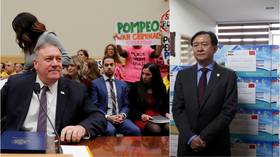Pompeo adds insult to injury by dangling coronavirus ‘help’ in front of sanctions-stricken Iran
28 Feb, 2020 17:23

US Secretary of State Mike Pompeo has criticized Iran's healthcare infrastructure while offering empty gestures of help, adding insult to injury after years of devastating sanctions have deprived the nation of lifesaving supplies.
Pompeo's dismissive take on Iran's struggle with the coronavirus epidemic verged on scornful, managing to gloss over the US' role in creating the supply and drug shortages exacerbating the outbreak, and to slam Tehran for not sharing "enough" information in just a few short sentences during a House Foreign Affairs Committee hearing on Friday.
ALSO ON RT.COMSanctions, assassinations, threats by US... Who’s surprised by hardliners winning Iran’s elections?
Pressed by Democratic congressman David Cicilline (Rhode Island) to explain precisely how Washington was putting aside its "maximum pressure" economic offensive against Iran to help fight an epidemic that doesn't respect geopolitical alliances, the diplomat chose his words carefully. He stated only that the US has "made offers to the Islamic Republic of Iran to help" with medical relief.
Their healthcare infrastructure is not robust, and to date, their willingness to share information about what's really going on inside the Islamic Republic of Iran is not robust, and I'm very concerned… that Iran is not sharing information.
The coronavirus outbreak has been especially harsh on Iran, sickening several government officials and killing the country's 81-year-old former ambassador to the Vatican, who became the highest-profile death from the disease earlier this week. On Friday, parliament was suspended indefinitely, an unprecedented move reflecting the gravity of the epidemic. At the same time, the country has been grappling with serious shortages of specialty drugs since the reimposition of the US' harsh sanctions regime in 2018, which while it officially exempts humanitarian supplies has, through overzealous enforcement and the threat of "secondary sanctions," spooked many banks away from doing any business at all involving the Islamic Republic.
Just last week, Iran saw its sanctions troubles compounded when it was blacklisted by the Financial Action Task Force (FATF), a Paris-based anti-money-laundering body whose curiously-timed decision, made at Washington's behest, has made it much more difficult for Iranian banks to transfer money with their foreign counterparts. The Iranian Association of Medical Equipment Importers complained to PressTV on Sunday that it could not purchase much-needed coronavirus test kits, despite several countries being willing to sell.
Yet the Iranian government's efforts to keep the people from panicking and stop the situation from spiraling out of control are being painted – by the US and its allies – as a "coverup," masking either draconian quarantine of entire cities (which Iranian authorities have flatly denied) or lax enforcement incubating a new pandemic (a media-catnip narrative marrying geopolitical and viral bogeymen). The outbreak has led Iran's neighbors to close their borders, creating a physical manifestation of the isolation the US has sought to impose upon the nation for so long.
"Help" patronizingly offered by Washington in such a situation is likely to be seen as an insult, given that the drug shortages and general poverty caused by US sanctions have clearly intensified the Iranian people's suffering.
Pompeo attempted to counter the mountain of evidence that the US is to blame for the Iranian medical system being less than "robust" by insisting "there has been a continuous avenue for the movement of medical and humanitarian goods inside [Iran]… they have not been sanctioned at any time." However, reality has demonstrated otherwise. The International Court of Justice in The Hague ordered the US to end its sanctions on "humanitarian" supplies to Iran in November 2018, but Foreign Ministry spokesman Abbas Mousavi told a press conference earlier this month that US obstructionism has continued to block such deliveries for over 18 months.
And Pompeo himself let slip last February that he was aware the "maximum pressure" regime had made "things… much worse for the Iranian people." Indeed, that was the point – "we are convinced that will lead the Iranian people to rise up and change the behavior of the regime." Human Rights Watch warned in October that these sadistic policies had "almost certainly contributed to documented shortages" of lifesaving drugs and placed the health of millions of Iranians in jeopardy.
ALSO ON RT.COMIran seals off religious sites as coronavirus death toll rises & Pakistan reports new cases
Even the Wilson Center – a think-tank on whose board Pompeo now sits – sounded the alarm about the "pronounced role of sanctions in creating shortages of life-saving medical supplies and drugs in Iran," calling the cause-and-effect relationship "irrefutable" back in 2013 – years before Trump pulled out of the nuclear deal and imposed even harsher sanctions.
Last month, Switzerland opened the Swiss Humanitarian Trade Arrangement, a private trade channel with Iran, in order to circumvent the thoroughly-blocked official channels, but Tehran has been forced to pay through the nose every step of the way and its patience is wearing thin. The spectacle of Pompeo – who famously said Iranian leadership must stop their "destabilizing" behavior if "they want their people to eat" – posing as Tehran's generous benefactor merely adds insult to years of injury.
As of Friday, Iran has 388 confirmed coronavirus patients, while 34 have died, meaning the mortality rate has far outpaced that of China, where the virus originated.

0 Comments:
Post a Comment
Subscribe to Post Comments [Atom]
<< Home